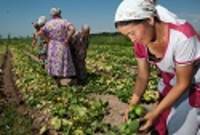The constraints that are common to all family farmers, are often exacerbated for rural women, because restrictive socio-cultural norms on women's roles in the household and in public life limit their ability to make decisions and seize opportunities. Women in family farms have greater overall workloads than men, as they have to combine farming activities with household responsibilities (cooking, cleaning, collecting fuelwood and water), care of children and the elderly, and often non-farm activities such as market trading or laboring. This leads to time poverty and lost opportunities for women to engage in training, access jobs outside of the family farm, or participate in rural organizations. Compared to men, women generally face more limited access to education, land, infrastructure, inputs, services and safety nets; have less decision-making power within households and communities; and are more likely to experience gender-based discrimination and violence.
Women's important role in family farming presents many opportunities for enhancing their economic and social empowerment as producers, processors, traders, workers and entrepreneurs. If women have the same access as men to productive resources, support services, technologies and loans, they can contribute to improving the agricultural productivity of family farms, engage in profitable processing and marketing activities, and increase their voice in household and community decisions. Expanding women's choices in family farming is thus a win-win solution: it contributes to women's empowerment while at the same time increasing agricultural productivity and strengthening rural economies at large.




